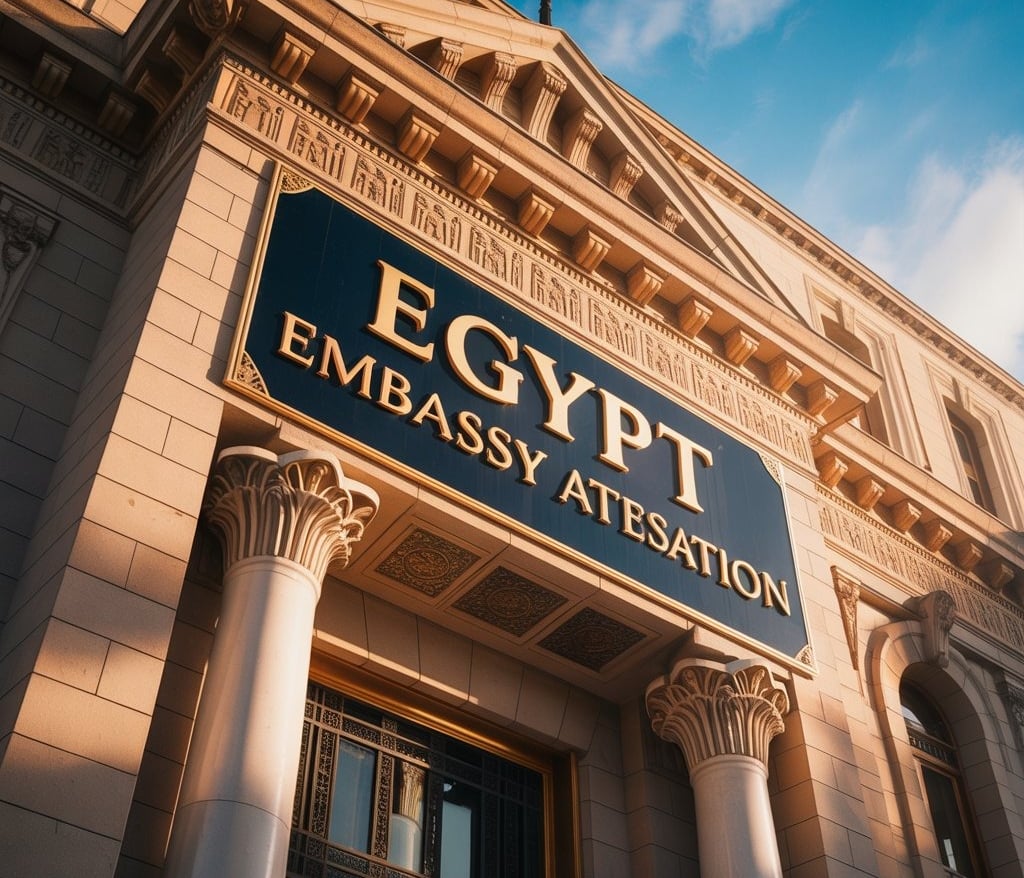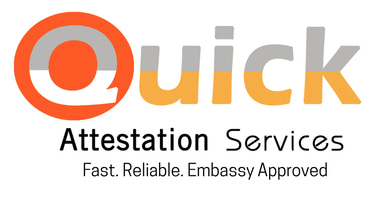Egypt MOFA Attestation: Comprehensive Guide
Discover a comprehensive guide to Egypt MOFA attestation, including all required documents and the step-by-step process to ensure your attestation is completed smoothly and efficiently.
9/17/20257 min read


Introduction to MOFA Attestation
The process of MOFA attestation, governed by the Ministry of Foreign Affairs in Egypt, serves as a critical verification mechanism for documents intended for both domestic and international purposes. This procedure ensures that official documents, such as educational certificates, marriage licenses, and corporate papers, are authenticated to confirm their legitimacy. The MOFA holds a pivotal role in this authentication process, providing an essential service that affirms the credibility of various documents, thereby assisting individuals and organizations in fulfilling legal prerequisites.
MOFA attestation is particularly significant for expatriates, students pursuing education abroad, and professionals needing to validate their credentials and documents for employment opportunities or legal matters in foreign nations. By obtaining MOFA attestation, individuals ensure that their documents are recognized by foreign authorities, which may require proof of legitimacy due to differing legal systems and practices across countries. Furthermore, the attestation process acts as a safeguard against fraud, enhancing the faith potential employers, institutions, or governmental entities place in the presented documents.
This guide aims to provide comprehensive information tailored for those navigating the MOFA attestation landscape. Whether you are a student looking to further your education internationally, an expatriate seeking to work abroad, or a professional needing to submit important legal documents, understanding the MOFA attestation process is crucial. By outlining required documents, procedural steps, and critical insights, this guide will facilitate a smoother experience for individuals involved in the attestation journey, ensuring they are well-prepared to meet the expectations of both Egyptian authorities and foreign entities.
Importance of MOFA Attestation
MOFA attestation plays a pivotal role in the validation of documents in a global context. For individuals looking to migrate or travel abroad, the authentication of documents by the Ministry of Foreign Affairs (MOFA) is often a prerequisite for various procedures, including visa applications. When applying for a visa, having MOFA-attested documents underscores the legitimacy of one's credentials, enabling applicants to meet the stringent requirements set forth by foreign governments. Without this attestation, the risk of visa rejection increases significantly, as embassies and consulates prioritize documented proof of authenticity.
Moreover, for students pursuing education overseas, MOFA attestation is equally imperative. Academic institutions abroad may refuse admission to applicants lacking attested educational qualifications. This form of validation assures prospective universities of the applicant's academic history and ensures recognition of the credentials presented. Hence, students must prioritize MOFA attestation to facilitate a smooth transition into their desired educational programs.
Similarly, in the professional sphere, job opportunities often hinge on the possession of authenticated documents. Employers in foreign countries frequently require MOFA-attested degrees, work experience letters, and other professional credentials to verify an applicant’s qualifications. The absence of such verification could result in missed employment opportunities, further emphasizing the necessity of document attestation for career advancement.
Additionally, MOFA attestation holds significant importance in legal matters. Legal documents, such as marriage certificates and power of attorney, often require authentication to be recognized in foreign jurisdictions. Failing to properly attest these documents may lead to legal complications, jeopardizing one's rights or standing in a foreign country. Therefore, understanding the importance of MOFA attestation is crucial for anyone engaging in international activities, as it safeguards against administrative hurdles and ensures the validity of one's documentation.
Complete List of Documents Requiring MOFA Attestation
The Ministry of Foreign Affairs (MOFA) attestation is a crucial step to ensure the authenticity of various documents, allowing them to be recognized in foreign jurisdictions. A wide array of documents is subject to this process, each serving specific purposes. Below is a detailed list of the documents that require MOFA attestation, along with their relevance.
Initially, educational certificates form a significant category, which includes degrees and diplomas from recognized institutions. These certificates are essential for individuals seeking employment, further education, or professional licensing abroad. They confirm the holder's academic achievements and are often mandatory for visa applications.
In addition to educational documents, personal records such as birth and marriage certificates also require MOFA attestation. Birth certificates verify an individual's identity and are frequently needed for passport applications, residency permits, and enrollment in educational institutions. Marriage certificates, on the other hand, authenticate the marital status of individuals, which is particularly important when applying for a spouse visa or during legal proceedings in foreign courts.
Commercial documents represent another category that necessitates MOFA attestation. These include trade licenses, partnership agreements, and incorporation documents. Attestation of such documents is vital for businesses looking to expand internationally, as it assures foreign partners and authorities of the legitimacy and credibility of the organization's operations.
Other documents, such as power of attorney, affidavits, and any official government documents that may be utilized in cross-border settings, similarly require MOFA attestation. Each of these documents must undergo the MOFA attestation process to ensure they are legally recognized and valid for use in foreign countries.
Step-by-Step Process for Attestation at MOFA
Obtaining MOFA attestation is a systematic process that involves several key steps. Understanding this procedure is crucial for ensuring that your documents are recognized in Egypt and other jurisdictions. Here's a step-by-step guide to help you navigate the MOFA attestation process efficiently.
The first step is acquiring necessary endorsements for your documents from relevant authorities. For instance, educational documents typically require confirmation from the Ministry of Education, while commercial documents may need validation from the Ministry of Trade. Ensure that these endorsements are correctly obtained as they serve as a prerequisite for MOFA attestation.
Once you have the required endorsements, the next step involves filling out the necessary MOFA forms. These forms are typically available on the official Ministry of Foreign Affairs website or can be obtained from the MOFA offices. It's important to complete all sections accurately, as any errors can lead to delays in the processing of your application.
After filling out the forms, compile all required documents, which may include copies of your passport, visa, and the original documents that are being attested. With all pieces in place, visit the MOFA office or submit your documents online, depending on the options provided. Be prepared to pay any applicable fees; these can vary based on the document type and the urgency of the request.
Typically, the processing time for MOFA attestation can range from a few days to a couple of weeks, depending on the volume of applications and the specific circumstances of your request. It is advisable to check for any updates on processing times directly from the MOFA or their official communication channels. Following this organized approach will help streamline the attestation process. Ultimately, proper preparation and adherence to requirements will ensure a successful outcome.
Common Challenges and Solutions in the Attestation Process
The MOFA attestation process is an important step for individuals seeking to validate their documents for use in Egypt. However, many applicants encounter various challenges that can hinder their progress. One common issue is document rejection due to errors or missing information. Inadequate attention to detail can result in applications being returned or delayed. Therefore, it is crucial to thoroughly check all documents for accuracy before submission. Applicants should ensure that all personal information, such as names and dates, are correct and match across all paperwork.
Another frequent hurdle involves the submission of documents that do not meet the specific requirements laid out by the Ministry of Foreign Affairs (MOFA). Each document may have unique stipulations regarding formatting, notarization, or accompanying letters that must be adhered to. It is advisable to refer to official MOFA guidelines or consult with experts in the field to ensure that all requirements are met. Additionally, using the wrong type of document or outdated versions can also lead to rejections. To mitigate this risk, individuals should confirm that they possess the most recent and approved versions of required documents.
Delays due to bureaucratic processes can be another frustration for applicants. In some cases, the attestation process can take longer than expected due to administrative backlogs. To circumvent this challenge, it is helpful to apply as early as possible and to maintain open lines of communication with the MOFA or the service provider handling the attestation. Staying updated on the status of the application through regular follow-ups can also aid in preventing prolonged wait times.
By being proactive and addressing these common challenges, individuals can increase their chances of a smooth and successful MOFA attestation process.
Fees and Payment Methods for MOFA Attestation
When seeking MOFA attestation in Egypt, understanding the associated fees is paramount for a smooth application process. The costs for attestation can vary depending on the type of document being authenticated, including educational certificates, commercial documents, and personal records. As of the latest updates, the basic fee structure includes a standard charge for each document, which typically ranges from EGP 200 to EGP 500. Additional costs may arise if expedited processing is required, with express services costing approximately 50% more.
Furthermore, MOFA may impose specific service fees linked with additional functions—like notarization or translation—if such services are needed as part of the attestation process. It is also essential to consider that while the Ministry of Foreign Affairs (MOFA) itself has fixed fees, third-party service providers may charge an extra fee for their involvement, which can lead to a variation in total costs. Individuals or businesses should inquire about these fees when opting for services outside of the standard MOFA procedure.
Regarding payment methods, MOFA accepts multiple forms of payment to accommodate different preferences. Cash payments remain a widely used option, but there are also electronic payment methods available, including credit and debit card transactions. Online platforms are increasingly being adopted, allowing applicants to pay remotely, thereby enhancing convenience. Additionally, some authorized agencies may enable payment through bank transfers or other digital wallets.
It is worth noting that certain groups may be eligible for discounts or fee waivers, particularly for students or non-profit organizations. Therefore, checking for applicable exemptions or reduced rates is advisable during the application process. Being informed about all associated fees and payment methods will ultimately facilitate a more efficient MOFA attestation experience.
Conclusion and Final Tips
Understanding the MOFA attestation process is crucial for anyone looking to validate their documents in Egypt. This procedure not only confirms the authenticity of important paperwork but also enhances its acceptance in foreign jurisdictions. Given the complexities surrounding the required documentation and the intricacies of the application process, it is essential to be thoroughly prepared.
Throughout this guide, we have outlined the essential documents necessary for MOFA attestation, including educational certificates, personal identification papers, and commercial documents. Each category of documents may require specific procedures and additional paperwork, thus ensuring you have all items completed according to your specific needs is imperative. It is advisable to keep an organized record of all documents needed for a streamlined experience.
Moreover, one of the final tips for a successful attestation process is to start early, as the MOFA attestation can take several days to process, depending on the type of documents and the volume of applications being handled at the time. Be sure to check for any updates regarding processing times or changes in requirements, which may arise due to transitional policies.
When submitting your documents, double-check their accuracy to prevent delays. Mistakes or missing information can lead to additional steps that could prolong the process. Lastly, consider seeking the assistance of professional services specializing in document attestation, as they can help navigate the complexities and ensure that everything is in order.
Ultimately, by adhering to these guidelines, individuals can approach the MOFA attestation procedure with confidence, ensuring that their important documents are verified efficiently and effectively for international purposes.
